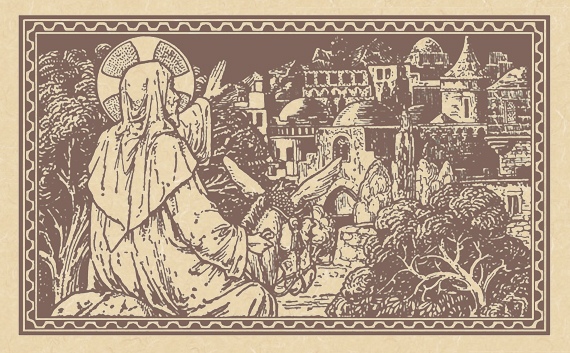You Don't Have to Be Bipolar to Read the Bible … But It Helps.
The Thirtieth Thursday of Ordinary Time.
Lessons from the primary feria, according to the ordinary form of the Roman Rite:
• Romans 8: 31-39.
• Psalm 109: 21-22, 26-27, 30-31.
• Luke 13: 31-35.
The Twentieth Thursday after Pentecost.
Lessons from the dominica,* according to the extraordinary form of the Roman Rite:
• Ephesians 5: 15-21.
• Psalm 144: 15-16.
• John 4: 46-53.
FatherVenditti.com
|
 6:57 PM 10/31/2019 — Just some very brief remarks for today. 6:57 PM 10/31/2019 — Just some very brief remarks for today.
As we forge ahead toward the Feast of All Saints and, ultimately, Christ the King and the end of Ordinary Time, the Missal shows us its grounding in an appreciation for the human condition, but at the same time sets up a rather lofty goal: maintaining our confidence in the face of total failure from a purely human perspective.
All too often we feel like the Psalmist in today's responsorial: “…in your great mercy rescue me. For I am poor and needy; my heart is pierced within me. […] Help me, Lord, my God; save me in your mercy” (109: 21-22, 26 NABRE); yet, the Blessed Apostle Paul, on trial in Rome for treason, knowing that he'll soon be going to his death, exhorts the Christians in Rome—and us—to hold fast, declaring, “If God is for us, who can be against us? He who did not spare his own Son but handed him over for us all, how will he not also give us everything else along with him? (Rom. 8: 31-32 NABRE).
It's not schizophrenic. This tension between despair and hope is one of the most common themes in all Scripture. “Jerusalem, Jerusalem,” our Lord says today, “you who kill the prophets and stone those sent to you, how many times I yearned to gather your children together as a hen gathers her brood under her wings, but you were unwilling!” (Luke 13: 34 NABRE). Our despair is of our own making. Our doubts about the final triumph of Christ the King is fueled by our own failure to cultivate that forgotten virtue of Hope. Even contemplating the victories of the saints, whose dedication to the Gospel caused them to suffer as our Lord did as a means to entering into heavenly glory, eludes us as we wallow in our own misery.
Our Lord Himself ends today's Gospel lesson by quoting another Psalm: “Blessed is he who comes in the name of the Lord” (118: 26 NABRE). But we know a lot of water has to flow under the bridge before we can sing that Psalm along with Him: before the triumph must come the battle; before the resurrection must come the passion. That's why the Feast of All Saints precedes the Feast of Christ the King: because Christ doesn't reign until He first suffers, and we don't rejoice by the empty tomb until we have stood at the foot of the Cross. That's why we're not absolved from our sins until we first kneel before Him and confess them.
When there is no singing we skip the verse before the Gospel, but not today: Benedictus qui venit rex in nómine Dómini; pax in cælo et glória in excélsis—“Blessed is the king who comes in the name of the Lord … peace to those on whom his favor rests” (cf. Luke 19: 38; 2: 14 RM3). And His favor will rest on each of us so long as we continue to increase in the virtue of Hope; and, we do that by enveloping ourselves in His Grace through seeking the expiation for our sins in confession, and staying ever close to His Sacred Heart in the Most Blessed Sacrament.

* In the extraordinary form, on ferias outside privileged seasons, the lessons from the previous Sunday are repeated.
|

